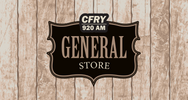Like many industries, farming benefits from advances in technology.
Ag Business & Crop Inc. president Felix Weber says precision tools are needed to accurately determine soil nutrition. And there are tools available to help producers make precision analyses.
"(One of our UAVs) uses different cameras than others in other industries to identify crop health differences during the cropping season. They are from our organization's perspective, very important, (as) you are able to look at the whole concept of the whole growth," Weber says. "You have to know what's available in the soil from a nutritionist's perspective all the way to harvest. We're trying to bring to the market tools with which you can measure information that can be used afterward to help that crop along."
Weber adds soil sampling can also be streamlined with a far more accurate method using tools, compared to what hand-sampling provides. He notes automated soil-samplers ensure the samples are consistent.
"Hand-sampling is great if somebody takes the time and does it properly. Can you have confidence in that soil sample?" Weber asks. "I was a consultant myself for fifteen years, and it was always difficult for me to hire somebody to make sure that person isn't just in a rush on a Friday afternoon and wanting to get it done."
"Also, from a perspective of how the sampling is done from a field, when you do soil-sampling or benchmark-sampling ... there are a couple of factors that are very important when you take a pound of soil that represents many acres. It has to be done precisely," continues Weber. "And if we talk about precision farming, it's important to perform the proper collection of data ... You take that information and you make a recommendation for that field or part of that field. It's very important that it's done properly."
With technology moving ahead at such a fast rate, Weber says workshops, such as Southport's recent Precision Ag Workshop, are invaluable.
"It's hard to keep up otherwise. The biggest thing that I usually get out of the workshops myself is talking to other people. In every workshop you find a speaker that can really bring you a lot of value when you go home. But talking to all the attendees and see how they're doing, I think, is just as of much value as the speakers. That is because, generally speaking, I find that workshops have more advanced people. And sometimes a basic idea is missed. Somebody comes and asks me a question, and I start to think about it. When I was farming on my own, I hired a consultant. The consultant asked me, 'Why do you hire somebody?' My answer was the most obvious thing you don't see any more. Getting a question at a conference like this might make you think of why you're doing it, and it might actually impose a change in your operation just because of that question. I would recommend it to anybody."













